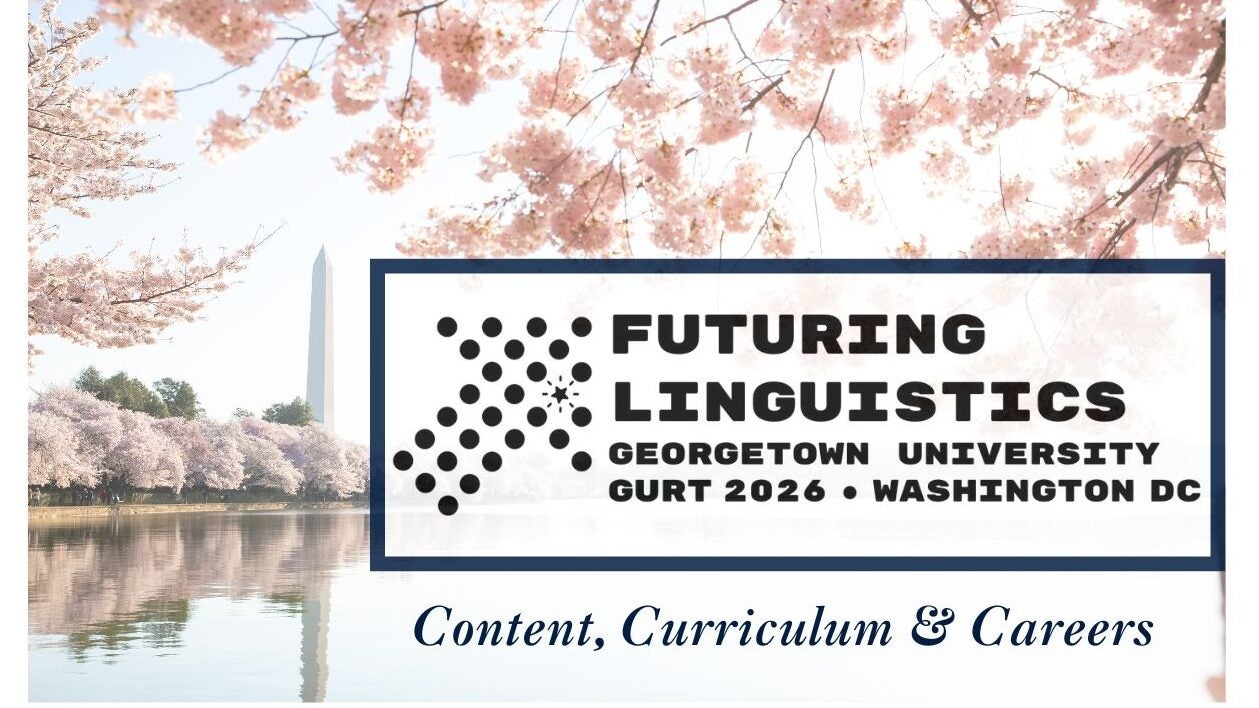The 2026 Georgetown University Round Table: FUTURING Linguistics

GURT 2026 | FUTURING LINGUISTICS: Content, Curriculum & Careers
GURT2026 invites linguists working in higher education, business, government, nonprofit and tech to come together to imagine our future.
What does the future of linguistics and future employment for linguists look like? If current trends in the field continue, as well as in academia and education, the vast majority of linguistics graduates will find employment in tech, business, government and nonprofit organizations.
GURT 2026 will be a place for linguists from a wide range of subdisciplinary and career trajectories to have important conversations about what’s next for linguistics? What innovations are we engaging in at the levels of content, curriculum and pedagogy, and career education? We welcome abstracts for individual papers, posters, and colloquiums that engage with any aspect of the following:
- Careers: How are content and pedagogy connected to a wide range of career pathways? What should be included in linguistics education to prepare for new and emerging jobs? What feedback do linguists working in business, government, nonprofit and tech have for linguistics programs in terms of content and training?
- Content: What is linguistics? What content should linguistics programs teach now so that graduates are prepared to be flexible and effective in their careers? How can linguistics programs continue to fulfill their educational mission while also making clear how the knowledge and skills learned in those programs translate into valuable career skills?
- Curriculum and pedagogy: How do linguistics professors teach linguistics? How do departments recruit and retain students from a diverse array of backgrounds as the future leaders of our field?
GURT2026 will represent a number of different academic and professional perspectives on linguistics. Let’s take this opportunity to share practices that can enliven and invigorate our teaching, research and work in diverse organizational contexts to keep linguistics a strong, viable area of training, research and post-graduate employment for years to come.
We invite your questions and any accessibility and accommodation requests. Please email us at gurt@georgetown.edu and a member of our organization team will respond to you personally.
Your GURT 2026 Organizing Team,
Alexandra Johnston (Chair), Yuko Hirasawa & Jing Xue
Georgetown University Department of Linguistics
Plenary Speakers

Associate Dean of Educational Affairs & Professor,
Stanford University

Professor of Linguistics & Director of the Sociolinguistics Laboratory,
University of Washington

Owner, Think Consulting
Georgetown University Round Table (GURT) history
The Georgetown University Round Table on Languages and Linguistics (GURT) is an annual academic conference that has been held since 1950 at Georgetown University in Washington, D.C. GURT is one of the most prestigious and long-standing conferences in the field of linguistics.
GURT provides a platform for scholars, researchers, practitioners from around the world to come together and discuss a wide range of topics related to languages and linguistics. Each year’s conference focuses on a specific theme with plenaries, presentations, panel discussions, and roundtables organized around that theme.
Over the years, GURT has covered a broad spectrum of topics, including but not limited to discourse analysis, language acquisition, language variation, assessment, phonetics and syntax. By covering these themes, GURT has played a significant role in advancing research and promoting collaboration among language and linguistics scholars.
Round Table with a group of selected scholars, students, and practitioners.
Networking Opportunities: Connect with a diverse range of researchers and practitioners.
Publication Opportunities: Selected papers will be published in the GURT Series published by Georgetown University Press.
